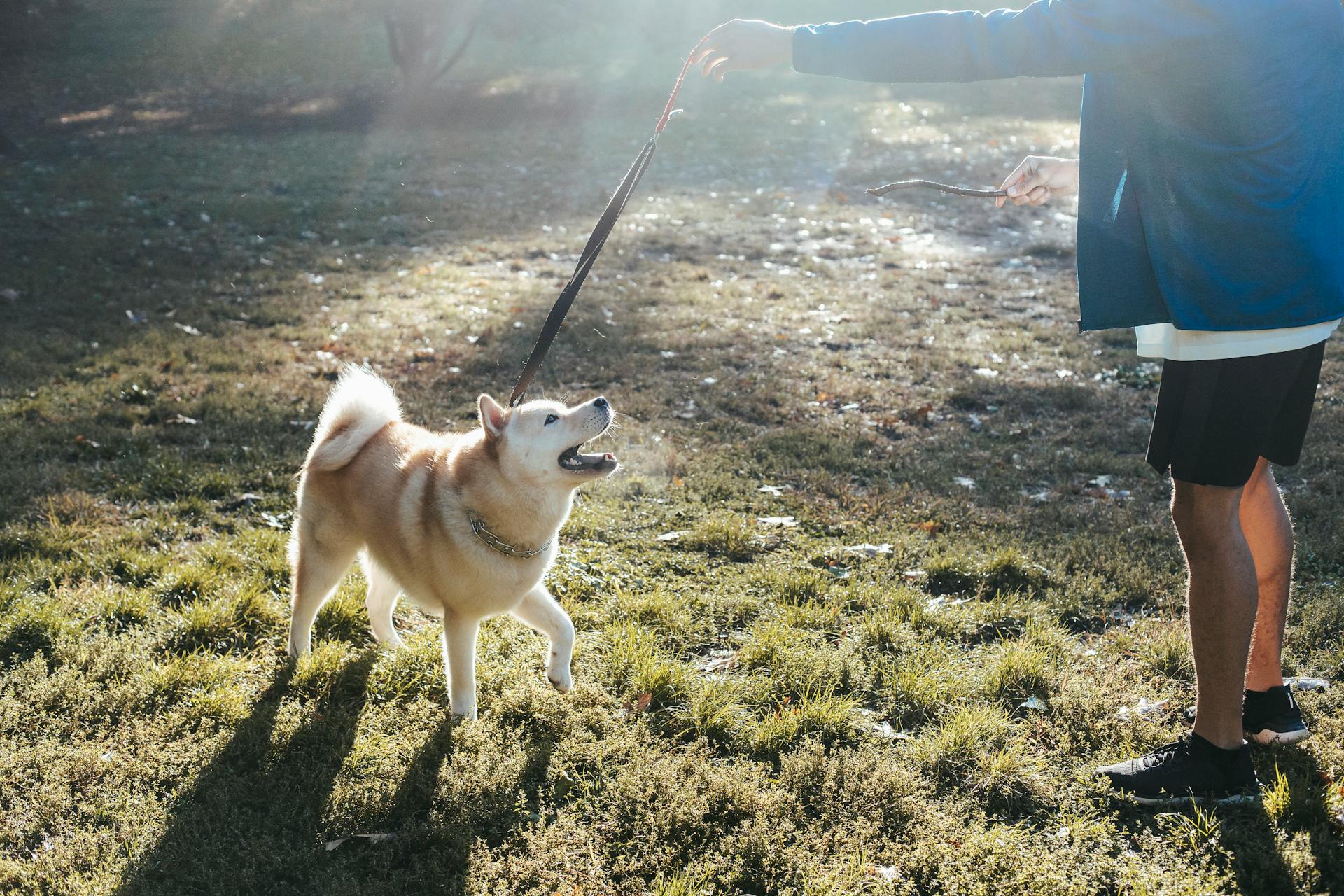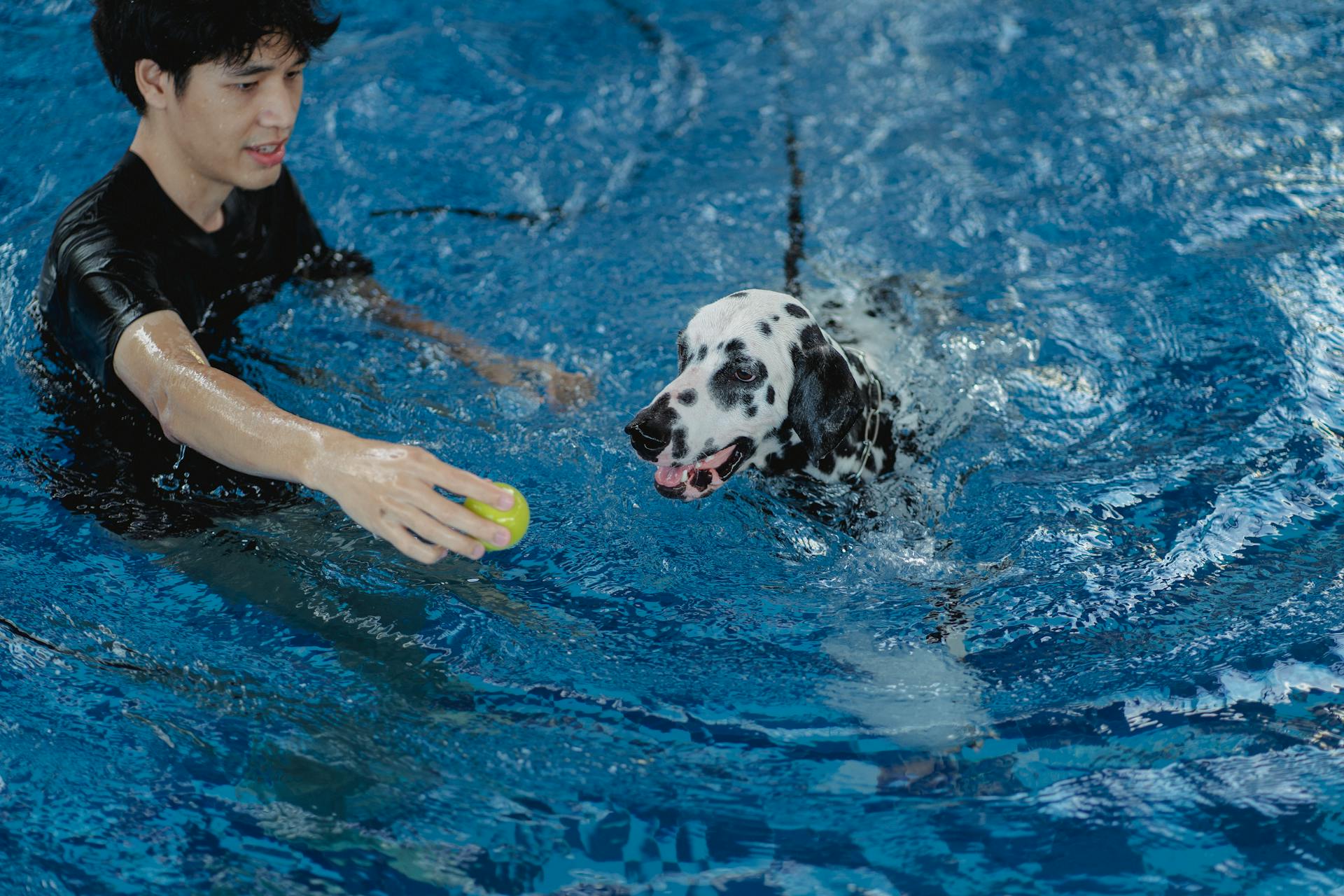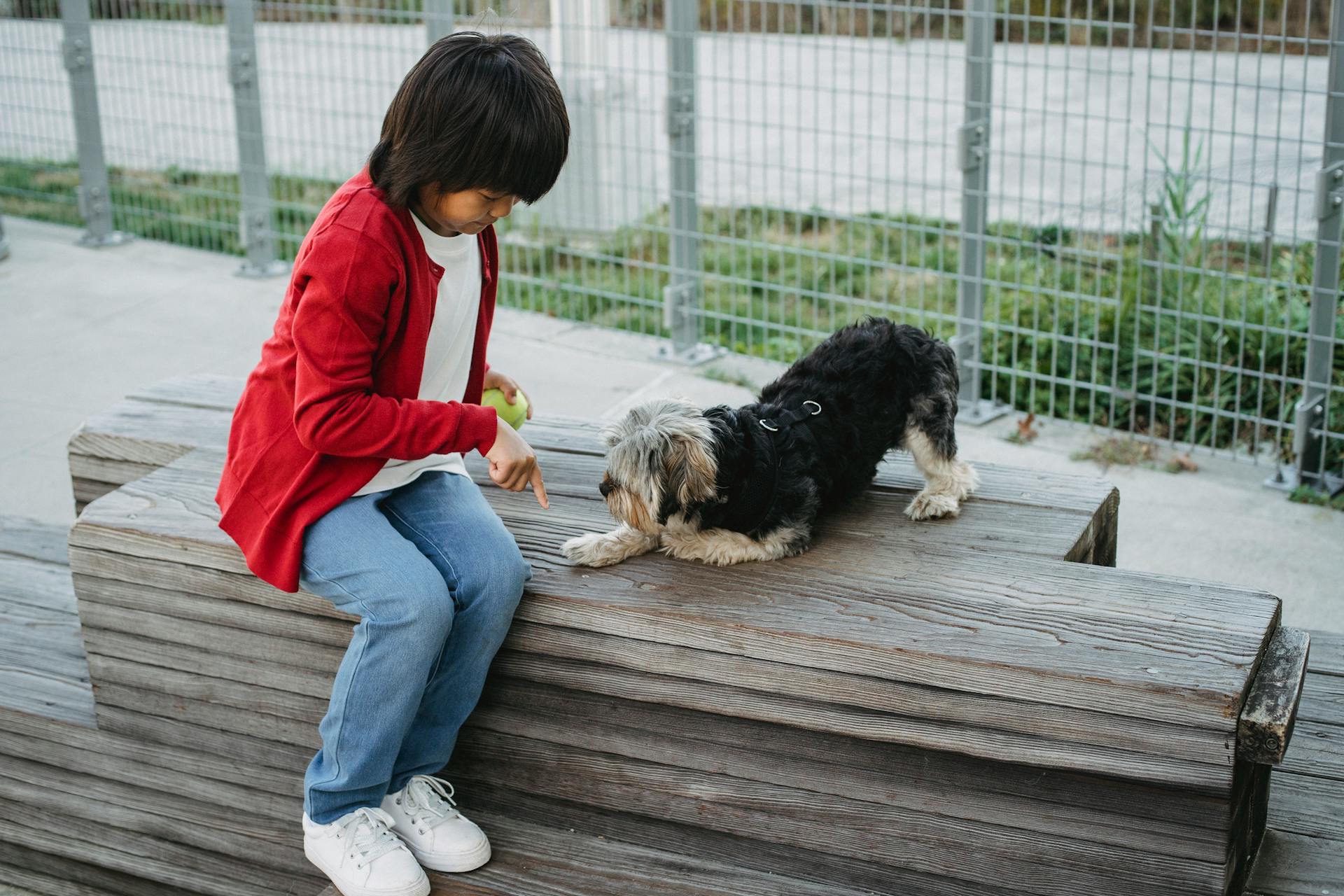
Disciplining a dog after the fact can be a challenging task, but it's not impossible. In fact, studies have shown that dogs can learn from past experiences, even if they're not corrected immediately.
The key is to understand that dogs live in the moment and don't have the same concept of time as humans do. They may not associate the punishment with the misbehavior if it's delayed.
If you're trying to discipline a dog after the fact, it's essential to be consistent and fair in your approach. This means setting clear boundaries and consequences for misbehavior, and sticking to them.
Consistency is crucial when it comes to dog discipline, as dogs thrive on routine and predictability.
Understanding Discipline
Discipline is a crucial aspect of dog training, and it's essential to understand what it means. It's not about punishing or scolding your dog, but rather about teaching them what's expected of them.
A key concept in discipline is setting clear boundaries and rules, which helps your dog feel safe and secure. This is especially important for puppies, who need structure and consistency to develop good habits.
By establishing a routine and sticking to it, you can help your dog learn what's acceptable and what's not. Consistency is key when it comes to discipline, as it helps your dog understand what's expected of them.
Differing Definitions

The term "punishment" is defined differently in common usage and in behavior science, causing problems of communication and understanding.
In common usage, punishment is an action taken against someone who has committed an offense, with no mention of rehabilitation or future behavior. This definition indicates that punishment is simply the unpleasant action taken against the offender.
Behavior science defines punishment as a consequence that follows a behavior, making it less likely to occur again in the future. This means that punishment hasn't occurred until we observe the behavior decreasing over time.
There are two types of punishment in behavior science: negative punishment, where something desirable is removed after a behavior, and positive punishment, where something aversive is added after a behavior. Both types are aversive and carry risks of side effects.
The traditional definition of punishment focuses on the action taken against the offender, while the behavior science definition focuses on the consequence's effect on future behavior. This difference can lead to misunderstandings and miscommunication.
Categories

Categories are a great way to organize the process of understanding discipline for your furry friend. Let's take a look at some key categories to keep in mind.
Before You Get Your Puppy
It's essential to consider factors like breed, temperament, and energy level before bringing a new puppy home. This will help you prepare for the right kind of training and care.
Raising a Puppy
The early stages of puppyhood are crucial for setting the foundation of good behavior and discipline. Establishing a routine and providing positive reinforcement are key.
Manners & Obedience
Teaching your dog basic manners like sitting, staying, and walking on a leash is vital for a well-behaved pet. Consistency and patience are essential in this process.
Adolescent Dog Training
As your dog enters adolescence, they may test boundaries and challenge your authority. Consistent training and clear communication can help navigate this phase.
Adult Dog Training
See what others are reading: Dog Training Facts

Even adult dogs can benefit from training and reinforcement. Updating their training and refreshing old habits can help maintain a well-behaved pet.
Behavior Problems
Identifying and addressing behavior problems early on can prevent more serious issues from developing. Common problems include barking, chewing, and digging.
Dog Behavior
Understanding your dog's behavior is key to effective discipline. By recognizing triggers and patterns, you can develop strategies to address unwanted behavior.
Retribution Feels Good
Retributive actions like yelling or shaking a dog by the scruff might interrupt the behavior in the moment, but they don't necessarily reduce it in the future.
A person who yells at their dog when it barks at the mail carrier might feel a sense of relief when the barking stops, but the behavior will likely continue the next day.
This is because the retributive action is often reinforcing to the owner, who feels a temporary sense of control or relief.
The Nobel Prize winner Daniel Kahneman refers to this as the "fast" system, where we react impulsively without thinking it through.
Suggestion: When Is Female Dog Ready to Breed
We might confuse the interruption with training, but it's actually just a short-term fix that doesn't address the underlying behavior.
The dog might even respond to the scruff shake as an invitation to play, rather than seeing it as punishment.
This can create a cycle of behavior that's difficult to break, where we're constantly reacting to the dog's actions rather than addressing the root cause.
Why Punishment Fails
Punishment doesn't work because it focuses on the behavior after it's already happened, rather than preventing it from happening in the first place. This is known as the "after-the-fact" approach, which can lead to confusion and frustration for both you and your dog.
Dogs don't understand the concept of punishment, and it can actually make them more anxious and fearful. In fact, research shows that punishment can decrease a dog's motivation to learn and increase the likelihood of future misbehavior.
Trying to punish a dog after the fact is like trying to put a Band-Aid on a broken leg - it's not going to fix the problem. Instead, it's essential to focus on prevention and setting clear boundaries before the behavior occurs.
Punishment can also lead to a decrease in trust between you and your dog. If your dog feels like they're being scolded or punished, they may become more hesitant to listen to you or follow your commands.
Frequently Asked Questions
Do dogs understand delayed punishment?
Dogs do not understand delayed punishment, which can lead to confusion and potentially worsen the unwanted behavior. Understanding timing is crucial when training dogs to avoid negative consequences.
Sources
- https://www.lecaacademy.com/post/the-myth-of-pack-training-for-dogs
- https://www.whole-dog-journal.com/behavior/punishment-vs-interruption-properly-managing-your-dogs-behavior/
- https://pupgradek9.com/do-you-need-to-discipline-your-dog/
- https://www.dogstardaily.com/blogs/after-punishment
- https://www.psychologytoday.com/us/blog/canine-corner/201305/does-punishing-dog-after-transgression-really-work
Featured Images: pexels.com


